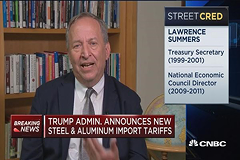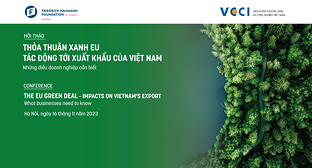Tariff increases could bring us back to 2008 crisis levels, World Bank warns
07/06/2018 12:00

- A ramp-up in the pace and scope of tariffs could set the world back to 2008 in terms of global trade levels, the World Bank has warned.
- An escalation of tariffs up to legally-allowed bound rates could translate into a global trade flow decline of 9 percent, similar to the drop seen during the global financial crisis in 2008-09.
- The hardest-hit areas would be emerging markets and sectors like agriculture and food processing.
A ramp-up in the pace and scope of tariffs could set the world back to 2008 in terms of global trade levels, the World Bank has warned.
In its latest Global Economic Prospects report, published Tuesday, the multinational finance organization had a grim forecast for both emerging and developed markets in the event that the commercial disputes underway between major economies intensifies.
"A broad-based increase in tariffs worldwide would have major adverse consequences for global trade and activity," the report said. "An escalation of tariffs up to legally-allowed bound rates could translate into a decline in global trade flows amounting to 9 percent, similar to the drop seen during the global financial crisis in 2008-09."
Canada, Mexico and the EU are unleashing retaliatory trade tariffs on the U.S. in response to the Donald Trump administration's announcement last Thursday that those economies would not be exempt from global steel and aluminum levies being imposed by Washington on national security grounds.
The developments follow threats between the U.S. and China, kicked off by the White House on accusations of Beijing's "unfair" trading practices and its massive trade surplus over the U.S., to hand down tariffs on billions of dollars' worth of each other's goods. The two countries are in ongoing negotiations in an attempt to avoid or lessen the tariffs.
Meanwhile, negotiations to overhaul the North American Free Trade Agreement (NAFTA) have failed to produce comprehensive agreements, leaving that deal — and the ease of trade it has enabled for 24 years — similarly under threat.
The hardest-hit areas in the event of increased protectionism would be emerging markets and developing economies, the World Bank said, with sectors like agriculture and food processing among the hardest hit.
And any setbacks to commercial activity in China or the U.S., the world's largest economies, "would result in significant negative spillovers for the rest of the world through trade, confidence, financial and commodity-market channels," the Bank added.
Fears overblown?
Short of a full trade war, the uncertainty stemming from the threat of significant economic policy shifts in major economies would negatively affect financial markets and activity worldwide. The Bank noted that trade liberalization trends had already been slowing for some time, with the number of new trade agreements hitting an 18-year low in 2017.
The dire warning echoes forecasts by S&P Ratings and the European Central Bank, both of which have predicted a contraction in global growth by up to 1 percent if trade tariffs were to expand. A broad consensus among international lenders and finance organizations sees more harm than good coming from a trade war, and even simply the threat of one.
The Trump administration has defended its decisions, citing national security, U.S. trade deficits with many partner countries, and a need to make other economies "play fair" when it comes to trade. With regard to China, it has also pointed to Beijing's lack of intellectual property rights protection, unequal market access, and government protection of its own industries.
Some market analysts have already forecast the onset of another U.S. recession within the next two years, with mounting debt, rising interest rates, cyclical factors and the growing trade tensions highlighted as key sources of concern. J.P. Morgan Chase chief executive Jamie Dimon recently said that the Trump administration's trade policy could be one of the "flies in the ointment" that ends the current economic recovery.
But several economists maintain that the world isn't headed for an all-out trade war, calling such fears overblown.
"I don't think we're going into a full-blown trade war. These are negotiating tactics," Julien Lafargue, European equity strategist at J.P. Morgan Private Bank, told CNBC's "Squawk Box Europe" on Wednesday.
And HSBC's Chief Foreign Currency Strategist David Bloom, speaking on the same show Tuesday, brushed off what he believed to be overreaction.
"It's a bit of tit-for-tat but I wouldn't call it a trade war," he said. "These things happen. We saw it under Bush; I think people are getting a bit alarmist about it."
Former U.S. President George W. Bush enacted stiff steel tariffs in 2002as an anti-dumping measure, only to rescind them by the end of the following year. Multiple studies by the U.S. International Trade Commission (ITC) and other groups found that the costs of the tariffs outweighed the benefits, as they hurt aggregate gross domestic product (GDP) and employment numbers.
In its latest Global Economic Prospects report, published Tuesday, the multinational finance organization had a grim forecast for both emerging and developed markets in the event that the commercial disputes underway between major economies intensifies.
"A broad-based increase in tariffs worldwide would have major adverse consequences for global trade and activity," the report said. "An escalation of tariffs up to legally-allowed bound rates could translate into a decline in global trade flows amounting to 9 percent, similar to the drop seen during the global financial crisis in 2008-09."
Canada, Mexico and the EU are unleashing retaliatory trade tariffs on the U.S. in response to the Donald Trump administration's announcement last Thursday that those economies would not be exempt from global steel and aluminum levies being imposed by Washington on national security grounds.
The developments follow threats between the U.S. and China, kicked off by the White House on accusations of Beijing's "unfair" trading practices and its massive trade surplus over the U.S., to hand down tariffs on billions of dollars' worth of each other's goods. The two countries are in ongoing negotiations in an attempt to avoid or lessen the tariffs.
Meanwhile, negotiations to overhaul the North American Free Trade Agreement (NAFTA) have failed to produce comprehensive agreements, leaving that deal — and the ease of trade it has enabled for 24 years — similarly under threat.
The hardest-hit areas in the event of increased protectionism would be emerging markets and developing economies, the World Bank said, with sectors like agriculture and food processing among the hardest hit.
And any setbacks to commercial activity in China or the U.S., the world's largest economies, "would result in significant negative spillovers for the rest of the world through trade, confidence, financial and commodity-market channels," the Bank added.
Fears overblown?
Short of a full trade war, the uncertainty stemming from the threat of significant economic policy shifts in major economies would negatively affect financial markets and activity worldwide. The Bank noted that trade liberalization trends had already been slowing for some time, with the number of new trade agreements hitting an 18-year low in 2017.
The dire warning echoes forecasts by S&P Ratings and the European Central Bank, both of which have predicted a contraction in global growth by up to 1 percent if trade tariffs were to expand. A broad consensus among international lenders and finance organizations sees more harm than good coming from a trade war, and even simply the threat of one.
The Trump administration has defended its decisions, citing national security, U.S. trade deficits with many partner countries, and a need to make other economies "play fair" when it comes to trade. With regard to China, it has also pointed to Beijing's lack of intellectual property rights protection, unequal market access, and government protection of its own industries.
Some market analysts have already forecast the onset of another U.S. recession within the next two years, with mounting debt, rising interest rates, cyclical factors and the growing trade tensions highlighted as key sources of concern. J.P. Morgan Chase chief executive Jamie Dimon recently said that the Trump administration's trade policy could be one of the "flies in the ointment" that ends the current economic recovery.
But several economists maintain that the world isn't headed for an all-out trade war, calling such fears overblown.
"I don't think we're going into a full-blown trade war. These are negotiating tactics," Julien Lafargue, European equity strategist at J.P. Morgan Private Bank, told CNBC's "Squawk Box Europe" on Wednesday.
And HSBC's Chief Foreign Currency Strategist David Bloom, speaking on the same show Tuesday, brushed off what he believed to be overreaction.
"It's a bit of tit-for-tat but I wouldn't call it a trade war," he said. "These things happen. We saw it under Bush; I think people are getting a bit alarmist about it."
Former U.S. President George W. Bush enacted stiff steel tariffs in 2002as an anti-dumping measure, only to rescind them by the end of the following year. Multiple studies by the U.S. International Trade Commission (ITC) and other groups found that the costs of the tariffs outweighed the benefits, as they hurt aggregate gross domestic product (GDP) and employment numbers.
Source: CNBC
Các tin khác
- Shrimp exports to major markets bounce back (22/04/2024)
- Vietnam becomes biggest rice supplier for Singapore (22/04/2024)
- Vietnam proposes removal of quota on shrimp export to RoK (22/04/2024)
- Early warnings reduce risks in trade defense (22/04/2024)
- Rubber exports are flourishing, promising potential (22/04/2024)
 Home
Home
 About Us
About Us




















